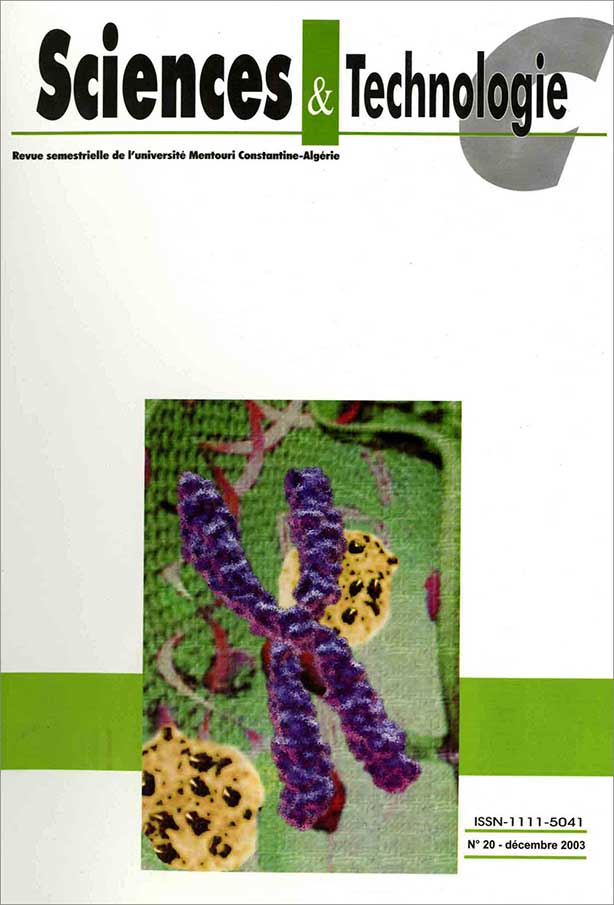فعالية الوسط المغذي والحافظ ومضادات الأكسدة على حركة وتشوه أكروزوم الحيوانات المنوية عند الإنسان خلال فترة المعادلة وصدمة البرودة
الملخص
خليلي كمال
مسيخ سامية
عبد النور شريف
جبالي نصيرة
بولعقود محمد الصالح
قسم البيولوجيا، كلية العلوم،
جامعة باجي مختار
عنابة، ص.ب 12عنابة
23000، الجزائر
لقد حاولنا من خلال هده الدراسة تسليط الضوء على فعالية بعض مضادات الأكسدة المضافة إلى إحدى الأوساط المغذية والحافظة على الجانب البيولوجي والمورفولوجي للحيوانات المنوية عند الإنسان، وذلك خلال فترة المعادلة وصدمة البرودة. بالنسبة للجانب البيولوجي والمتمثل في قياس نسبة الحركة، أظهرت الدراسة أن الوسط المغذي والحافظ أو هذا الأخير مضاف إليه مضادات الأكسدة (ViT E) او المركب المخلبي كان لهم فعالية في الحفاظ على حركة الحيوانات المنوية سواء خلال فترة المعادلة أو صدمة البرودة، وذلك مقارنة بتلك الغير معاملة. بالنسبة لتشوه منطقة الأكروزوم، أوضحت النتائج أن الوسط المغذي والحافظ المستعمل أو عند تدعيمه بمضاد الأكسدة (ViT E) أو المركب المخلبي كانت له فعاليه كبيرة في تقليص نسبة التشوه وذلك سواء خلال فترة المعادلة أو صدمة البرودة مقارنة بتلك النسب المحصل عليها في العينات الغير معاملة.
المراجع
- Ackerman D.R., "Fructose utilization of spermatozoa cooling and freezing", Inter. Fertil., N°12, (1967), pp.1-4.
- Aitken R.J., Clarkson J.S. and Fishel S., "Generation of reactive oxygen species, lipids peroxidation and human sperm function ", Biol. Reprod., 40 (1989), pp.183-197.
- Al-Hanak H., "Effect of tocoferol on bull semen", Animal. Scie., 26, N°8 (1989), pp.70-74.
- Bamba K. and Cran D.G., "Effects of treatment with BHT on the susceptibility of boar spermatozoa to cold stress and dilution", J. Reprod., 95, (1992), pp.69-77.
- Barthelemy C., Royer D., Hammanah S., Lebos C., Tharanne M. J. and Lansac J., "Ultrastructural changes in membranes and acrosome of human sperm during cryopreservation", Archiv. Androl., 25, (1990), pp.29-40.
- Beconi.M.T., Affranchino M.A., Schang L.M. and Beorleghi N.B., "Influence of antioxidants on SOD activity in bovine sperm", Biochem. Inter., 23, N°3, (1991), pp.545-553.
- Crister J.K., Arneson B.W., Aker D.V., Huse-Benda A.R. and Ball G.D., "Cryopreservation of human spermatozoa", Fertil. Steril., 47, (1987), pp.980-984.
- Graham J.K. and Foote R. H., "Effects of several lipids, fatty acid chain length, and degree of unsaturation on the motility of bull spermatozoa after cold shock and freezing" Cryobiology, 24, (1987), pp.42-52.
- Graham J.K. and Hammersted R.H., "Differential effects of BHT analogs on bull sperm subjected to cold induced membrane stress", Cryobiology., 29, (1992), pp.106-117.
- Jones R. and Mann T., "Damage of ram spermatozoa by peroxidation of endogenous phospholipids", J. Reprod. Fertil., 50, (1977), pp.255-260.
- Kampschmidt R.F., Mayerd T. and Herman H.A., "Lipids and lipoprotein constituents of egg yolk in the resistance and storage of bull spermatozoa", J. Dairy. Scie., 36, (1953), pp.733- 742.
- Lindemann C.B., Obrien J.A. and Giblin F.J., "An investigation of the effectiveness of certain antioxidants in preserving the motility of reactivated bull sperm models", Biol. reprod., 38, (1988), pp.114-120.
- Marinov P., Groudova G., Semkov M. and Zlatarev C., "Study of the effect of diluents containing antioxidants on the freezability of spermatozoa in Cryobiology of sex cells", Bull. Acad. Scie., Sofia, (1983), pp.102-111.
- Netter F. and Gondet A., "Banque de sperm", Eds. Masson Cie., Paris, (1974), pp.63-67.
- OMS., "Manuel de laboratoire", Eds INSERM (1993).
- Polge G., Smith A. and Parkers A., "Revival of spermatozoa after vitrification and dehydration at low temperatures", Nature, 164, (1949), pp.666-669.
- Prins G.S. and Weidel L., "A comparative study of buffer systems as cryoprotectants for human spermatozoa", Fert. Ster., 46, N°1, (1986), pp.147-149.
- Slater T.F., " Free radical mechanism in tissue injury", Biochem. J., 222, (1984), pp.1-15.
- Watson P.F., "The effects of cold schock on sperm cells membranes. In: effects of low temperature on biologycal membrane ", Eds. Acad. press. New York, (1982), pp.189-218.
- Zlatarev S., Marinov P., Mincheva M., Spasov C. and Ananiev V., "Investigation on media and regimes for freezing of human semen", In: Cont. Prob. Biol. Immun. Reprod., eds., Bul. Acad. Scie., Sofia, (1983), pp.179-187.
- Wense D.L., Peaster M.L., Himsl K.K., Leach G.E., Lad P.M., Zimmern P.E., "Stimulated reactive oxygen species generation in the spermatozoa of infenile men". J. Urol., (1993), p.149.
- Mokadem H. and Khelili. K., "Exploration cytologique et biochimique dans l’hypofertilite masculin", Jour. Scie. A.T. Biotech., Sousse, Tunisie (2001), pp.9-11.
- Khelili K., Boulakoud. M.S. and Abdennour C., "Study on The effect of bradykinin and bradykinin analogues on bovine sperm motility in vitro", C.R. Acad. Bul. Scie., 53, 4 (2000), pp.107-110.
- Aurousseau B., "Les radicaux libres dans l’organisme des animaux d’élevage : conséquences sur la reproduction, la physiologie et la qualité de leurs produits", INRA Prod. Anim., 15,(2002), pp.67-82.
- Leboeuf B., Restall B. and Salamon S., "Production et conservation de la semence de bouc pour l’insémination artificielle", INRA Prod. Anim., 16, (2003), pp.91-99.
- Dalvit G.C., Cetica P.D. and Beconi T., "Effect of alpha-tocopherol and ascorbic acid on bovine in vitro fertilization", Theriogenology, 49, (1998), pp.619-627.
- Blondin P., Coenen K. and Sirard M.A., "The impact of reactive oxygen species on bovine sperm fertilizing ability and oocyte maturation", J. Androl., 18, (1997), pp.454-460.


